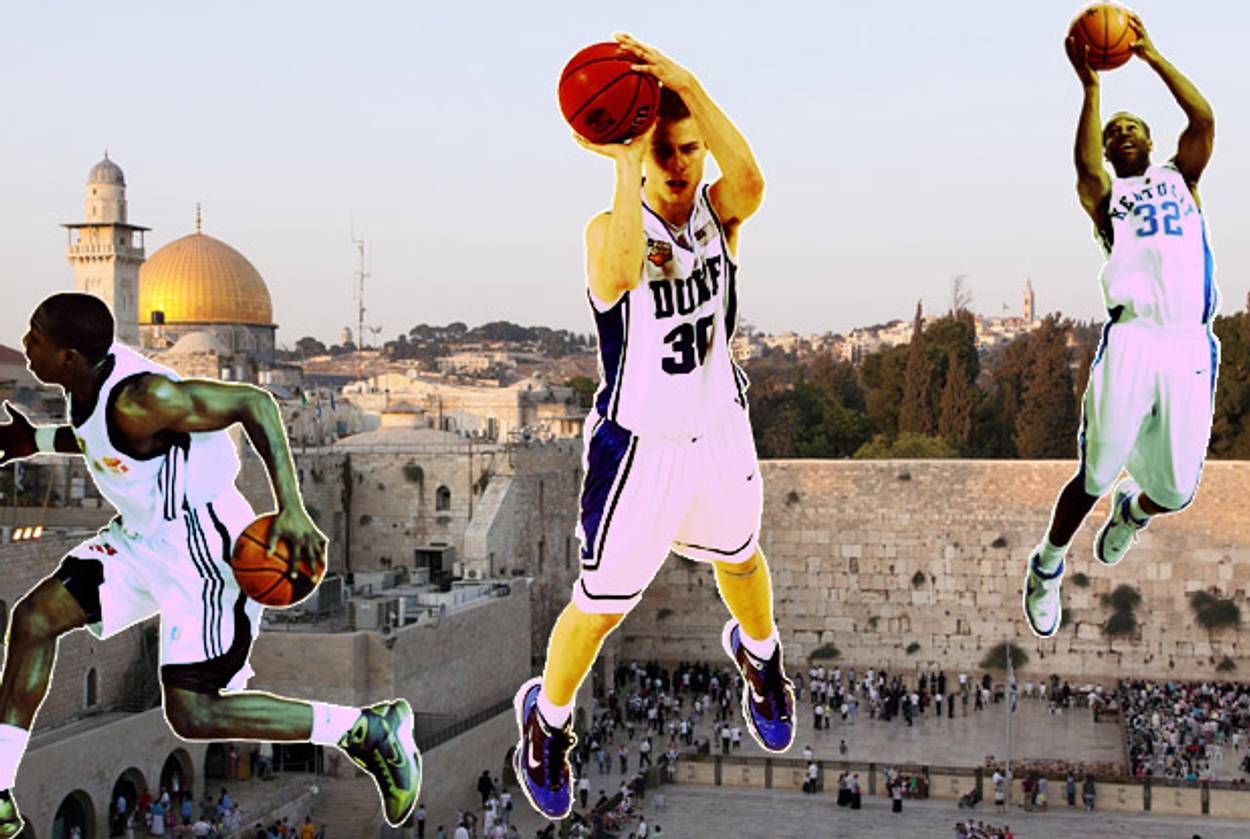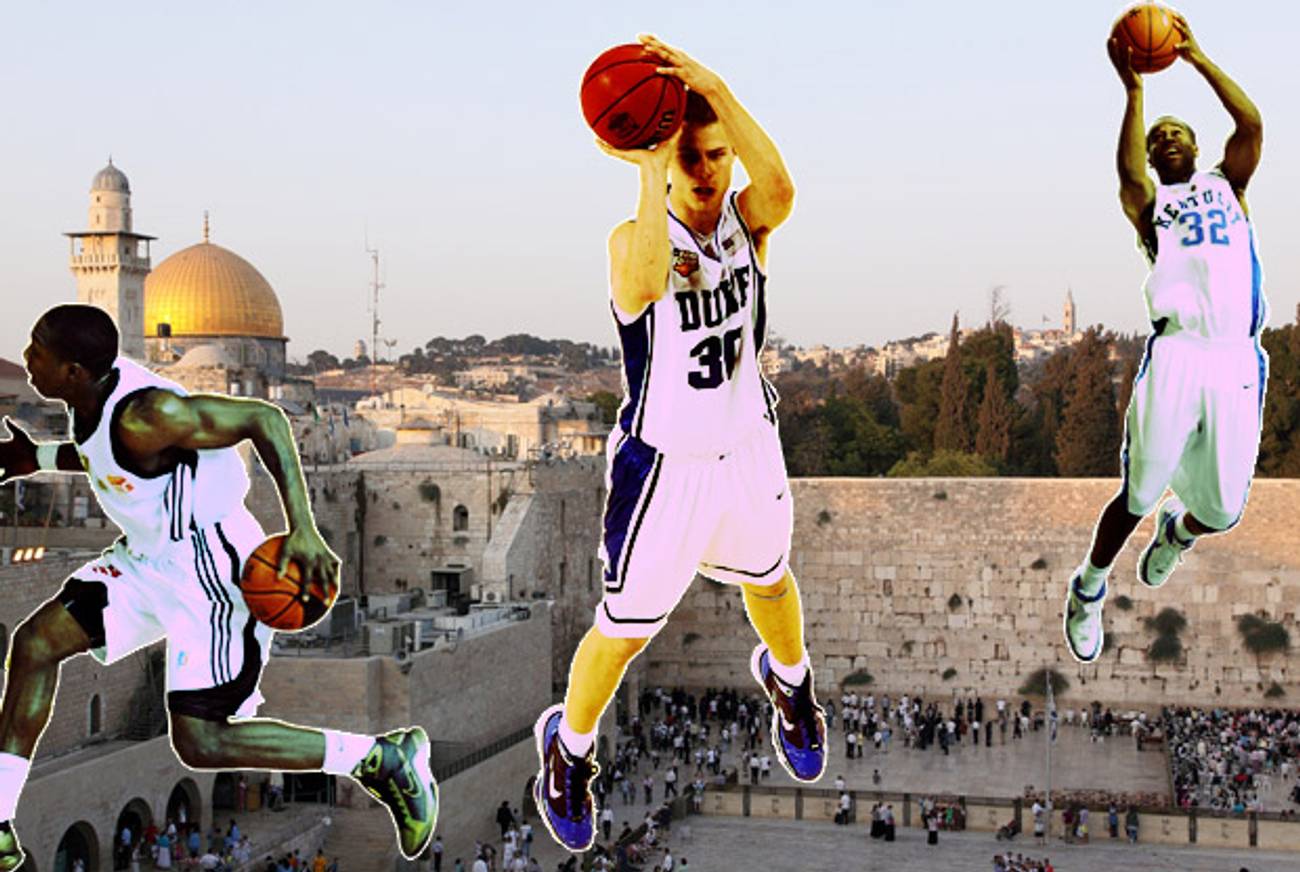Mad Men
Trash-talking in the locker room, all-nighters by the TV—March Madness hits Israel, thanks to former NCAA ballers who play in the Israeli League




Thousands of miles away from the nearest NCAA game, bleary-eyed basketball fans roam the streets of Jerusalem and Tel Aviv suffering from March Madness, a phenomenon known in Hebrew as Mertz Hameshugah. Annual American rituals of obsessing over this month’s college basketball tournament—keeping track of brackets, betting in pools, arguing over games at bars—have made it here, and the time difference has only heightened the emotions around the games.
American college basketball hasn’t traditionally been a major concern among Israelis; the country’s sports channel isn’t even airing the tournament. But Mertz Hameshugah continues to spread nonetheless, thanks in large part to the presence of some 50 former NCAA players from top Division I American schools who are now playing professionally in the Israeli Basketball League.
In his four years at the University of Kentucky, Ramel Bradley played in four NCAA tournaments; his rookie year, the team made it to the Elite Eight. Now, after a stint playing for Maccabi Ashdod, he’s a guard for Hapoel Jerusalem. This month, his focus is the Wildcats, no matter the hour: “I don’t care about anyone else,” he said in a recent interview. “I just can’t believe how good they are.” He predicted the Wildcats will go far—meaning two more weekends of very late nights in front of the television.
Bradley’s brought March Madness onto the court as well: He comes to Jerusalem’s practices in Wildcat blue. He also gets decked out in Kentucky gear when he watches his college team play, and tweets with fans back home during the games. Along with former Kentucky teammate Joe Crawford, who now plays for Maccabi Rishon Letzion, Bradley does his share of trash-talking with the other American players in Israel. When we spoke, he had some thoughts for Jon Scheyer, the Jewish former Duke star who was a key part of the 2010 Blue Devils team that went all the way. After Duke was upset 75-70 by No. 15 seed Lehigh last Friday night, Bradley said Scheyer “should be in tears.”
Scheyer is taking Duke’s loss in stride. “Ramel and Joe have to be feeling pretty good right now. Kentucky is certainly looking like the team to beat,” said Scheyer, who now plays for Maccabi Tel Aviv, the perennial Israeli champion and powerhouse in the European league. (Israeli teams compete in the European league in professional basketball.) Even though Duke is now out of the tournament, Scheyer says the games are still “a lot of fun for me to watch.”
There’s plenty of NCAA talk in the Maccabi Tel Aviv locker room as well. Scheyer’s teammate Richard Hendrix played for Alabama; Devon Smith went to Virginia; and Keith Langford scored 19 points in the 2003 final for Kansas when they lost 81-78 to a Syracuse team led by current New York Knick Carmelo Anthony. Besides Duke, Alabama and Virginia were also knocked out of the tournament on Friday. “It was a tough night for Richard, Devon, and me. Keith, though, had plenty to say,” said Scheyer, as Kansas advanced to the next round.
Their consolation, however, was that they were able to remind the team’s other American-born player, Sean James, that his Duquesne team didn’t even make the tournament.
Besides Scheyer and Langford, several other players in Israel have not only been in the Big Dance, but have also been to the Final Four, including John Thomas, who plays for Jerusalem and whose 1997 Minnesota team was defeated by Kentucky in the semifinals; Tony Skinn, a member of the Ashkelon team who was a key part of the George Mason team that got to the Final Four in 2006; and Skinn’s teammate Jamie Skeen, who played for the Virginia Commonwealth University Cinderella team that made it to the Final Four last year.
The NCAA tournament has gotten a push in recent years with the advent of ESPN International and Fox Sports, which are two of the 11 sports stations that are available on Israeli cable and satellite television. But American college basketball is still fighting an uphill battle for exposure among Israelis, despite the popularity of basketball as a sport, and the NBA in particular.
Israeli media personality and longtime sports commentator Ofer Shelah has at least one explanation of why college basketball has not caught in the same way as has the NBA. “For Israelis, who go to university at a much older age, after several years in the army—not to mention often after traveling the world—they go to school to study. For them there is not the same emotional attachment to their school as there is for Americans, who for them university is a ‘life experience.’ ”
Yona Mishan, owner of a Jerusalem sports bar, notes that there is definitely increased traffic during NCAA tournament time, but he says, “It’s mostly U.S. college students studying abroad, or Americans who have lived in Israel for a long time but still follow their college teams.”
Nonetheless, local newspapers in Israel have begun covering the tournament more extensively than they did 10 years ago, according to Shelah, because they want to follow future stars who might end up in the NBA, or in their own 11-team Israeli league. One senior Israeli coach confessed that most coaches tune in for scouting purposes. “I only watch NCAA games because I need to see certain players.”
Israeli hoops aficionados may not care whether Kentucky or Syracuse wins, but they are willing to sacrifice some sleepless nights during Mertz Hameshugah to see the players that they’ll eventually be watching in the NBA—or on the courts of Jerusalem and Tel Aviv.
Todd Warnick is a consultant and freelance writer living in Jerusalem. He also refereed basketball for more than 30 years, including 25 years in professional leagues in Israel and Europe.
Todd Warnick is a consultant and freelance writer living in Jerusalem. He also refereed basketball for more than 30 years, including 25 years in professional leagues in Israel and Europe.